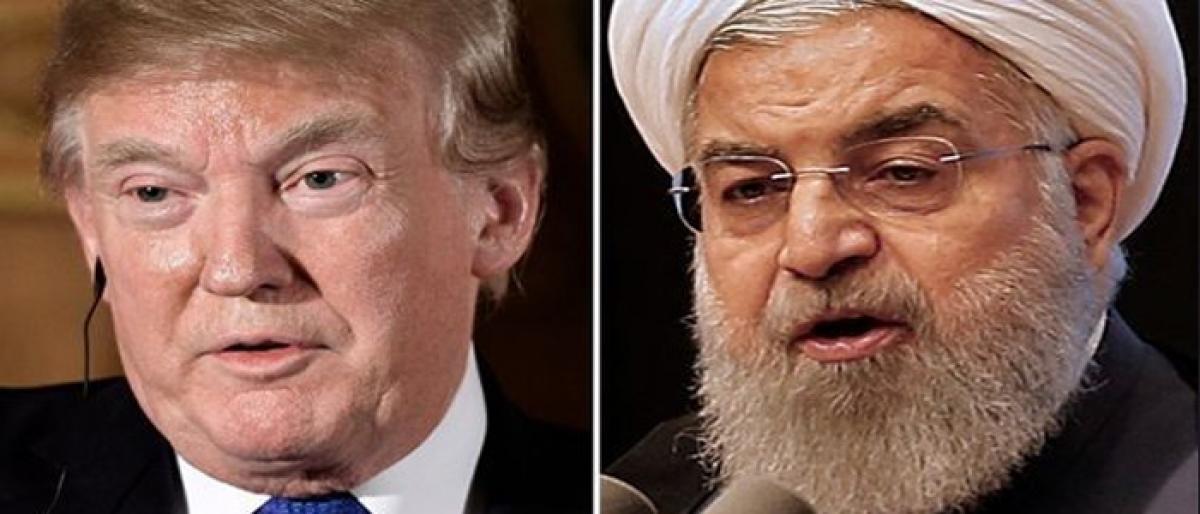Live
- ‘Get Set, Grow Summit 2024’ Focuses on Digital Detox for Families
- Stokes motivates his team to put in extra effort, says England pacer Potts
- From overcoming setbacks to leading India in U19 Women’s Asia Cup, Niki Prasad's amazing journey
- Driving Enterprise Security: Inside Venkata Reddy Thummala’s Leadership Journey
- Constitution debate: PM Modi hails 'Nari Shakti'; makes strong pitch for 'United Bharat’
- Abhijeet Bhardwaj: Revolutionizing Enterprise Analytics with Innovation and Expertise
- Bihar: Inquiry initiated against principal who went to buy veggies during school hours
- Press Sri Lankan Prez for release of Indian fishermen: TN Cong MP to EAM Jaishankar
- TN: DMK postpones executive meet due to heavy rains & Parliament session
- Porous silicon oxide electrodes can fix durability issues in batteries: Researchers
Just In

Benjamin Netanyahu has accused Iran of lying “big time” about its nuclear programme. In a theatrical announcement on Monday last week, the Israeli Prime Minister presented files and CDs that he claimed show Tehran hid secret nuclear plans after signing the multinational 2015 Joint Comprehensive Plan of Action (JCPOA) agreement.
Benjamin Netanyahu has accused Iran of lying “big time” about its nuclear programme. In a theatrical announcement on Monday last week, the Israeli Prime Minister presented files and CDs that he claimed show Tehran hid secret nuclear plans after signing the multinational 2015 Joint Comprehensive Plan of Action (JCPOA) agreement.
The Israeli leader’s PowerPoint presentation has offered no substantive evidence. Much of his presentation focused on Iran’s nuclear programme in the years before it signed the deal. Regardless, Netanyahu has probably given Trump more impetus to do what he’s wanted to do since his campaign undo the Iran nuclear deal.
Over the past 15 months, Tehran has accused Trump of failing to live up to US commitments on sanctions relief under the deal by encouraging other countries not to do business with Iran. (White House spokesman Sarah Sanders has said that Trump last year specifically asked more than a dozen foreign leaders “to stop doing business with nations that sponsor terrorism, especially Iran.”)
Implicit in Trump’s approach is that he can bully and pressure Iran into meeting his demands. However, the track record of US-Iran relations since the 1979 Iranian revolution leaves little room to believe that Iran concedes to pressure. The modus operandi of Iranian leaders when it comes to addressing pressure is to become inflexible, steadfast and retaliatory.
This was evident during the nuclear dispute from 2002 to 2015, when in reaction to the longstanding US demand of zero uranium enrichment on Iranian soil, Iran greatly expanded its nuclear programme. The key to the July 2015 nuclear deal was not US sanctions, but its accepting Iran’s bottom line: acknowledgement of its uranium enrichment program and nuclear fuel cycle infrastructure.
The Iran-Iraq War is also testament to the fact that Iran does not buckle under even the most egregious pressure. Contrary to the perception of some in Washington, Iran’s key economic indicators are strong and growing. Its GDP grew 11 per cent last year, average real per capita income is on the rise, and the price per barrel of oil is hovering around $70 and on an upward trajectory. Politically, President Hassan Rouhani seems secure after being re-elected with a significant margin over his nearest rival last May.
Importantly, the protests that rocked parts of Iran some months ago should be seen in the context of ever-competitive Iranian domestic politics, along with genuine economic grievances derived from dashed expectations regarding the benefits of sanctions relief and subsidy reforms made in Iran’s national budget.
Iran is also far from isolated on the international stage, maintaining amicable ties with Europe and increasingly strategic relationships with global powers such as China and Russia. Rouhani recently paid a state visit to India, where he signed numerous trade agreements, and has travelled to Russia and Turkey in recent months.
Trump would be committing a major strategic miscalculation if he believes that withdrawing from the nuclear deal leaves Iran with no options but to continue abiding by the agreement. Rather, Tehran’s adherence reflects the strength of its commitment to its international commitments and eagerness to build confidence with Europe and other international partners.
If Trump withdraws, Iran could use the deal’s main dispute mechanism to refer US non-compliance to the UN Security Council. That would isolate Washington and needlessly set it on a path of dangerous escalation with Iran. Abrogation of the agreement could also allow Iran to justify ramping up its nuclear programme.
The end state to Trump’s approach on Iran could very well be war. Such a conflict will not only portend devastating consequences for the United States and Iran, but further destabilize the Middle East as it tries to move on from the scourge of Islamic State.
However, Trump has a policy alternative: diplomacy. The diplomatic option is possible today and does not require aggressive posturing to be successful. If Trump really wants “bigger deals” with Iran, he should build trust by properly implementing the JCPOA, and then engage Iran with respect and not insults.

© 2024 Hyderabad Media House Limited/The Hans India. All rights reserved. Powered by hocalwire.com







